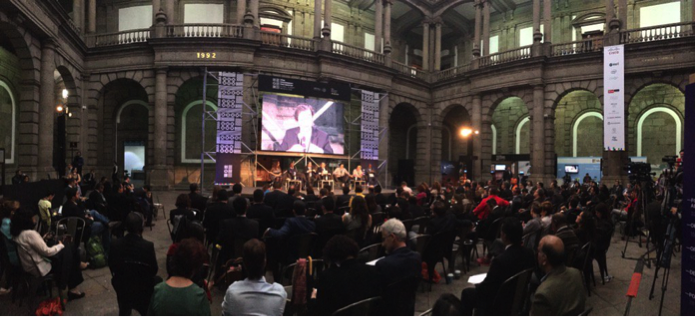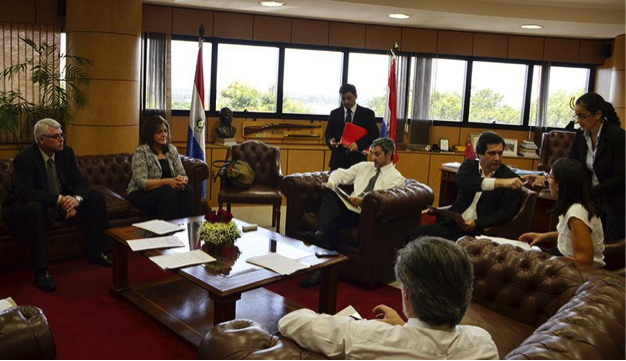Legislative openness is one of OGP’s greatest success stories
This piece originally appeared on the OpeningParliament.org blog. ¿Quieres leer este blog en español?
The Open Government Partnership (OGP) has always been positioned primarily as a platform. There are few detailed prescriptions of what member countries must do aside from meeting initial eligibility requirements and creating a process that puts the government and civil society at the table in order to build home-grown agendas for government transparencyAccording to OGP’s Articles of Governance, transparency occurs when “government-held information (including on activities and decisions) is open, comprehensive, timely, freely available to the pub... More and citizen engagement.
The beauty of promoting this relatively open-ended process, rather than a more prescriptive approach, is that successes can be organic and extend far beyond what was initially intended.
With this in mind, legislative branch participation in the OGP model should be seen as one of its greatest achievements—albeit one that wasn’t perhaps envisioned when OGP was created.
OGP was launched in 2011 as a platform for the executive branches of member countries to engage with civil society organizations to advance executive branch openness. Until 2013, there was little discussion of the inclusion of other branches or levels of government. Late that year, OGP launched the Legislative Openness Working Group (LOWG), co-chaired by the Congress of Chile and NDI, in order to begin the conversation about how legislatures might participate in this process and to promote exchange around OGP national action plan (NAP) commitments that require legislative action. The LOWG also provided an opportunity to engage a growing community of civil society organizations focused on parliamentary monitoring and reform, including over 180 organizations from 80 countries which have endorsed the Declaration on Parliamentary Openness.
In retrospect, engagement of parliaments in OGP seems obvious—under most constitutions, legislatures are supposed to be the most open and responsive branch of government. Their engagement is also pragmatic—roughly fifteen percent of total government action planAction plans are at the core of a government’s participation in OGP. They are the product of a co-creation process in which government and civil society jointly develop commitments to open governmen... commitments require legislative action. And if there is to be sustained engagement in OGP despite a change in government, it is helpful to have leadership from across the political spectrum engaged. Such leadership only operates within legislatures.
A session on open parliamentEnsuring access to legislative information and creating mechanisms for public participation are critical to building an open, trusting relationship with citizens. Technical specifications: Commitments... More takes over the main stage at the 2015 OGP Global Summit in Mexico City.
Since the LOWG’s launch, there has been growing legislative participation in OGP, including a formal legislative track at last year’s OGP Summit in Mexico. But what’s most notable is that many legislatures have used the OGP model in order to pursue reform efforts outside of the established OGP process. In many countries, legislators are now interacting with civil society to pursue dialogue around reform. Some legislatures have created their own separate action plans, which is often important given separation of powers concerns. As a result of this momentum, OGP’s Steering Committee is planning to discuss legislative participation in OGP at the Africa regional meeting in Cape Town next month.
In the lead-up to that event, NDI and the Legislative Openness Working Group will publish a new guide on legislative participation in OGP. In it, we detail key examples of how OGP countries have pursued legislative openness agendas and the types of commitments being made. The case studies range from the establishment of alliances with civil society, legislative caucuses, commissions and committees, to ultimately the creation of legislative action plans.
Legislative success stories around the globe
Some of the most remarkable stories have come out of Latin America. The Congress of Chile was the first legislature of an OGP-member country to launch a separate action plan in 2014, under the leadership of their Bicameral Commission on Transparency. Mexico was the first to bring together a formal alliance of Congress with civil society to promote greater dialogue and the discussion of commitments for greater legislative openness.
The sharing of the experiences of these countries and others played a crucial role in the passage of an access to information law in Paraguay in 2014. This law had been championed by a transparency caucus in the Paraguayan Senate and a coalition of civil society groups, which had participated together in the 2013 OGP Annual Summit in London. Just this month, members formed a permanent committee on transparency in the Paraguayan Senate and are beginning the process of creating a legislative action plan.
Members of the Senate of Paraguay meet to inaugurate a formal committee on parliamentary openness in April 2016 (Photo credit: Senate of Paraguay).
Following this momentum, the President of the National Assembly of Costa Rica has worked with civil society to launch a legislative action plan in late 2015, and in March 2016 these partners worked with the LOWG and hosted an international exchange with peers from the region in San Jose. Regionally, ParlAmericas, the network of legislatures in the Americas, has established a regional Open Parliament Network, which met for the first time in Mexico City at the 2015 OGP Summit.
Members of the Inter-Factional Working Group of the Parliament of Georgia pose with the inaugural
OGP Government Champion Award for their work to create a legislative action plan.
Progress is by no means limited to Latin America. Georgia has taken a leadership role in Europe to advance legislative openness. Following participation in several LOWG events and with the support of Georgian civil society groups such as the Institute for Development of Freedom of Information (IDFI), the Georgian Parliament established a multi-party working group to work with civil society to create an action plan. The Open Parliament Georgia Action Plan was launched in 2015, participants in the working group won the first ever OGP Government Champions Award at the 2015 OGP Summit. It is noteworthy that the award was given to a parliamentary body, rather than a government. To build on the working group, the parliament created a permanent council on open and transparent governance in December 2015. Georgia hosted a meeting of the LOWG with participants from 30 countries in September 2015, and several countries in the region are now working on similar initiatives, including Ukraine, where the parliament launched an action plan in February. In Serbia, the parliament has established a working group with civil society to pursue openness reform. France’s National Assembly also submitted a legislative action plan in 2015.
In Africa, Ghana has led the way in integrating members of parliament, along with government and civil society, in developing its NAP. Ghana’s national OGP steering committee was among the first to formally invite representatives of parliament and parliamentary-focused civil society organizations (CSOs) to participate in this process. Ghana’s 2016-2017 National Action Plan contains important parliamentary commitments, and several new processes are being implemented, including the opening of committee hearings and the release of MPs’ asset declarations. Hon. Emmanuel Bedzrah, who is a member of Ghana’s national OGP steering committee, has piloted new methods of citizen engagement in his position as chair of the parliament’s Government Assurances Committee.
Elsewhere in the region, Kenya has replicated Ghana’s example, and recently invited an MP to participate in the process of developing the national action plan. Other Kenyan parliamentarians have expressed interest in convening an open parliament caucus. And South Africa has listed parliamentary openness as one of its priorities as lead chair of OGP, and will invite sessions on the topic as part of the upcoming OGP regional meeting in Cape Town. Like in Latin America, regional bodies such as the Pan African Parliament, whose president participated at the 2015 OGP Summit in Mexico, have expressed interest in advancing the OGP model on the continent.
Taking citizen engagement seriously
What’s remarkable about all of these examples is that the momentum around legislative openness and the OGP model has been built despite there being no formal processes for legislatures to participate in OGP aside from a working group. A growing number of parliaments continue to create legislative action plans. However, unlike with government’s OGP commitments, there is, as yet, no independent review mechanism (IRM) for these legislative action plans, which provide an important complement to NAPs.
The OGP Steering CommitteeThe Steering Committee is OGP’s executive decision-making body. Its role is to develop, promote and safeguard OGP’s values, principles and interests; establish OGP’s core ideas, policies, and ru... meeting in Cape Town in May provides an opportunity to recognize and build upon the incredible progress made by parliaments as a result of their use of OGP as a platform. There are a host of other international organizations that are or have expressed willingness to support legislatures interested in greater openness, from UNDP to ParlAmericas, the OAS, World Bank, Pan African Parliament, to name only a few.
At a time when OGP encourages its member governments to make “stretch commitments” that are transformative in nature, OGP should hold itself to the same standard, making commitments that continue to stretch itself organizationally. If open government is about citizen engagement as well as open dataBy opening up data and making it sharable and reusable, governments can enable informed debate, better decision making, and the development of innovative new services. Technical specifications: Polici..., there are few things that OGP could do that are more potentially transformative than welcoming the representative branch of government—parliaments and legislatures—into the OGP process.
Visit the website of the Open Government Partnership (OGP)’s Legislative Openness Working Group at http://www.opengovpartnership.org/groups/legislative.



